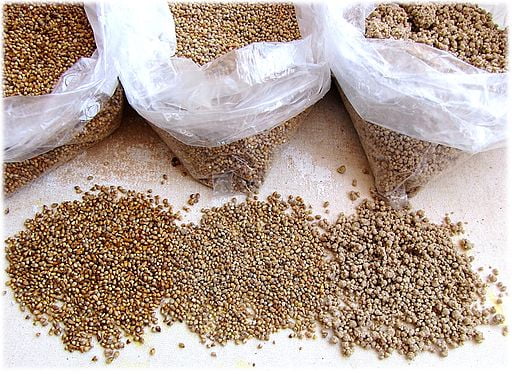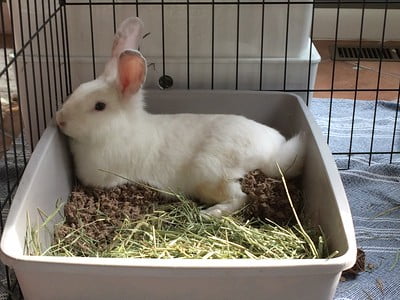Last Updated on March 12, 2023 by Marjon Ramos
Rabbits’ heartbeats range from 130 to 350 beats per minute. A rabbit’s heart rate can increase due to stress, high temperature, obesity, and pain.
Different rabbit sizes also have different heart rates. Smaller rabbits have higher heart rates, while larger breeds have slower heart rates.
Now that I’ve given you the gist of the article, read on as I explain the article in more detail:
Table of Contents
What causes a rabbit’s heart to beat fast?
Here are the most common reasons that cause a rabbit’s heartbeat to increase:
Obesity
Obese rabbits have a higher resting heart rate than non-obese rabbits. This can lead to other heart problems like hypertension and cardiac hypertrophy (an abnormal enlargement or thickening of the heart muscles).
Pain
Pain can also affect your rabbit’s heart rate. Pain in rabbits is harder to detect compared to other animals because they don’t have any obvious pain markings, such as howling or whimpering.
Instead, rabbits would likely just sit still and hide away at the back of their cage. In order to know if your rabbit’s heart rate is increased due to pain, you can look for additional signs that your rabbit is in pain, like:
- Hunched posture
- Loud tooth grinding
- Lack of grooming
- Restlessness
- Aggression
- Increased heart rate
- Increased respiratory rate
- Reduced appetite
Stress
Stress can also lead to an increased heart rate. A lot of things can stress a rabbit enough to induce an increase in their heart rate, such as:
- Loud noises
- Predators (dogs, cats, owls, etc.)
- Pain
- Unfamiliar surroundings
- Transport (car rides, moving to a new home, etc.)
- Excessive handling
High temperature
High temperatures can also lead to increased heart rate because rabbits can’t sweat (except for a few glands in their lips). This makes them susceptible to overheating and heatstroke due to high temperatures, especially in the summer.
The ideal temperature for rabbits is between 55-70 °F (13-21 °C). Your rabbits are at risk of overheating or heat stroke if temperatures rise above 85 °F (29 °C).
Here are the most common symptoms of heatstroke in rabbits:
- Rapid breathing
- Gasping for air
- Loss of appetite
- Bluish or grey lips
- Exhaustion
Here are some things you can do to protect your rabbit from heatstroke and what you can do if they already have it:
- Never place your rabbit in direct sunlight.
- Place a bottle of cold water near them during the summertime.
- Provide them with shade when they are outside.
- Wrap your rabbit’s body with a moistened towel. Don’t wrap their ears because it helps them regulate the temperature.
- Don’t soak your rabbits in water if you suspect them of heatstroke because it could provoke shock.
Size
Different rabbits have different resting heart rates. Smaller breeds of rabbits that are 1.1–3.5 pounds have higher resting heart rates. While larger rabbit breeds or 6-12 pound rabbits have lower resting heart rates.
How to know if your rabbit’s heartbeat is faster than normal?
You can tell if your rabbit’s heartbeat is normal by feeling its pulse through its femoral artery (upper inner thigh). You can also place your hand on the lower left side of your rabbit’s chest and feeling for the heartbeat.
You can then count your rabbit’s heart rate for 15 seconds and multiply that by four.
The normal heart rate for rabbits is 130-350 beats per minute. This is highly dependent on your rabbit’s stress levels, age, size, and current health.
If you do feel that your rabbit’s heart rate is higher than 350 bpm and you’re seeing additional symptoms that would concern you, call your veterinarian for proper advice.
What’s the normal heart rate for rabbits under anesthesia?
Typical heart rates on rabbits under anesthesia are 240–280 beats per minute. It can even go as low as 120–280 beats per minute if the rabbit is given medetomidine (Flecknell, 2000).
Cite this article:
Sources
- Varga, Molly, and Frances Harcourt-Brown. Textbook of Rabbit Medicine: Revised and Edited. Elsevier, 2014.
- Temperature, Heart and Respiration Rates




